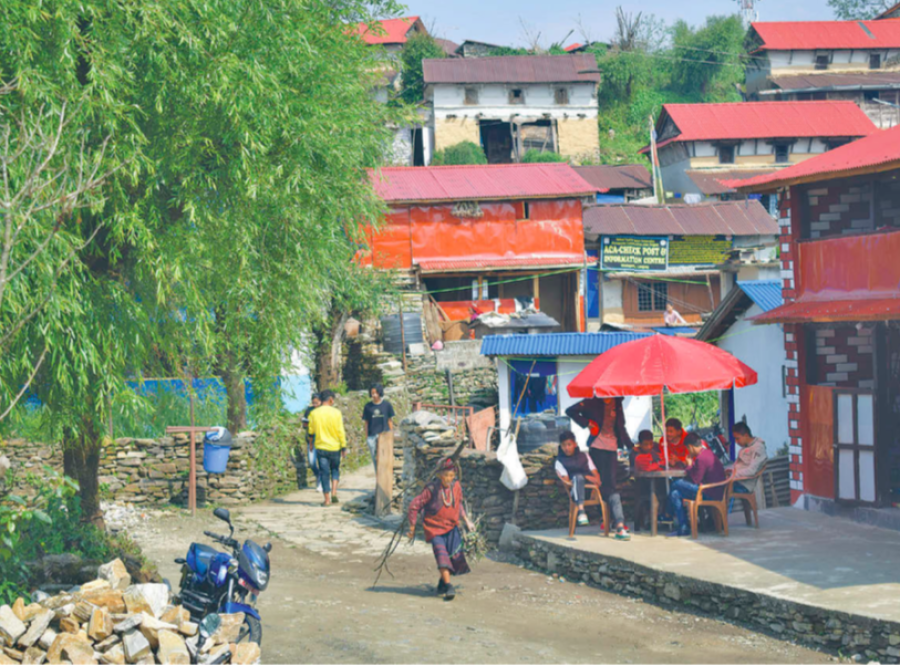National
With tourists staying home, homestays have no business
The pandemic and the lockdown could lead to a collapse of homestays that have provided communities with economic support and a sense of identity.
Elisha Shrestha
When the Visit Nepal 2020 tourism campaign was first announced, Dilli Maya Magar was excited. For the past nine years, Magar has been operating a homestay in Dhankuta’s Namje village, hosting both domestic and foreign tourists, and she was hopeful that the Visit Nepal 2020 would boost an already flourishing homestay industry in the community.
Namje’s 13 community homestays were expecting around 400 to 500 guests a month from March until May but then Covid-19 began to spread. The government in Nepal responded by cancelling Visit Nepal 2020 and imposing a nationwide lockdown that prohibited all public movement.
“Due to the Covid-19 outbreak, we are completely out of business in the months that were supposed to be our peak time,” Magar told the Post.
Homestays are community-based lodgings where visitors reside with locals and take part in the local culture. In recent years, homestays have emerged as a popular means for rural communities to shore up their local economy while also preserving and sharing their ethnic culture.
According to 2018 data from the Ministry of Tourism, community-based homestays increased from 217 in 2015 to 324 in 2018. According to Kesab Badal, president of the Nepal Homestay Association, along with community-based homestays, there are more than 800 private homestays in the country.
Purna Bahadur Gurung, who hosts a homestay at Sirubari village in Syangja, was hoping to make good money during peak tourist season. Generally, he makes Rs40,000 to Rs50,000 a month.
“There are 17 houses that provide homestay services in our Gurung village,” he said. “These houses have the capacity to accommodate around 84 guests. However, right now, we are just waiting for the lockdown to be over so that we can get back to business.”
In most areas, homestays are part of an economic chain, buying locally produced goods and farm products to serve tourists. A lack of homestay business means a knock-on effect that ripples throughout the entire community.
“We produce organic vegetables. We have a poultry farm and cows for milk,” said Magar. “I am afraid that we won’t be able to compensate for our financial losses even after the lockdown.”
According to Badal, the impact of Covid-19 on the homestay industry could affect around 40,000 people.
Dibya Shakya, who operates a homestay in Nakabahal, Lalitpur, invested around Rs8 million in renovating his home to function as a homestay and he’s afraid that he won’t be able to recoup his investment.
“Those who were planning to stay for longer periods of time have returned to their countries and right now, only two out of eight rooms are occupied,” said Shakya. “Even if the lockdown ends, it will take a year or two to recover from the financial loss caused by the pandemic.”
The pandemic and the ensuing lockdown have already hit the tourism and hospitality industries hard, with many smaller outfits on the verge of collapse. The pandemic has led to cancellations of flights while the lockdown has meant that even domestic tourists are not allowed to travel.
But homestay operators fear that even when the lockdown is lifted, business might take a while to pick up.
“The whole idea of homestay is to share a home with locals to get to know their culture. But the pandemic has pushed the idea of not sharing anything with others. In the future, I am afraid that tourists will opt for hostels instead of homestays,” said Magar.
While homestay operators agree that lockdown was necessary to control the spread of Covid-19 in the country, they also hope that the government will come up with some form of financial support to keep the homestay industry afloat.
“We understand the role we have to play in public health. Personally, I don’t want to reopen the homestay service since we are close to Dharan and cases of Covid-19 have been reported in the hospital there. However, if we don’t get any support from the government, our industry will not survive,” said Magar.
Before the homestay industry was introduced in Namje village, Magar said that around 70 percent of households were financially struggling to make ends meet. Most young people would either go to India for work or were engaged in agriculture. But with the homestay, many individuals like Magar were able to make good money while staying home.
“Being a host has not only provided me with financial security but it has also given me an identity,” she said. “I am proud of my culture because of which I am self-employed. But as lucrative as the tourism sector is, it is also just as vulnerable.”




 23.12°C Kathmandu
23.12°C Kathmandu (1).jpg)














